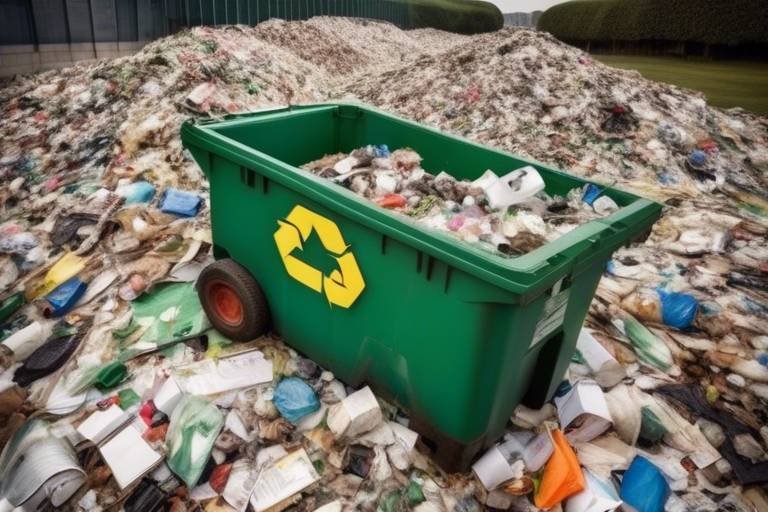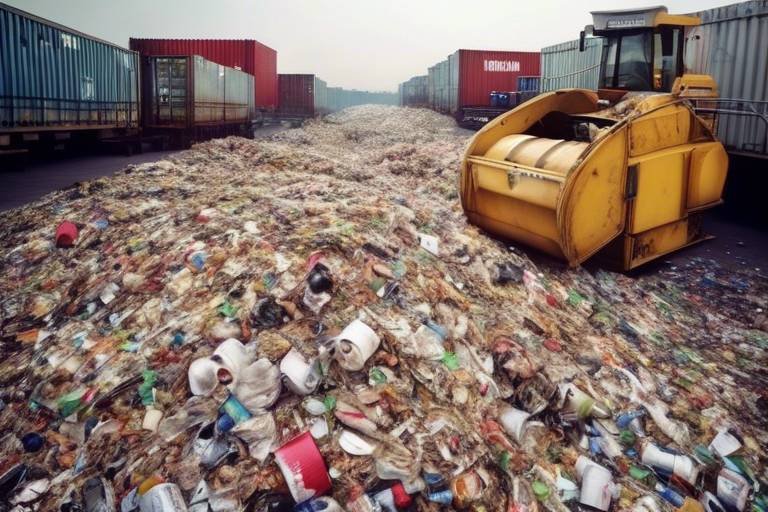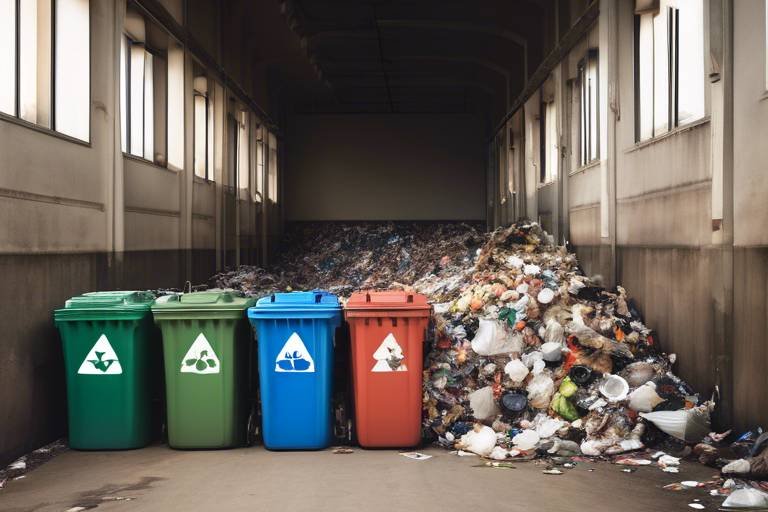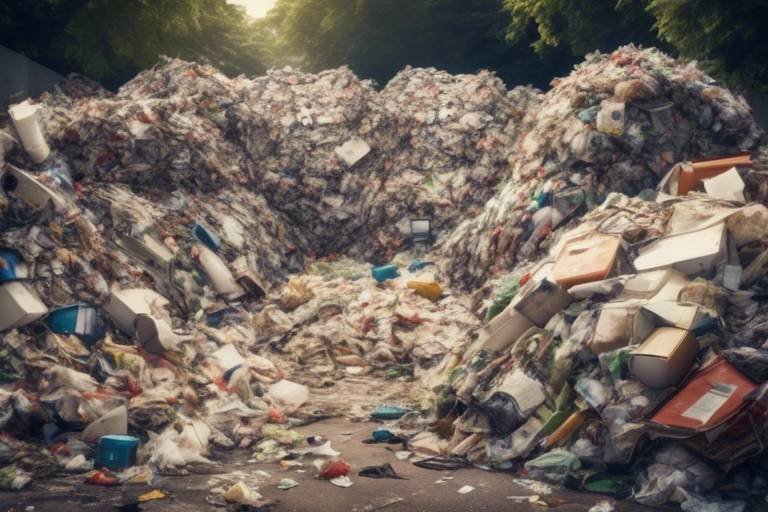Understanding the Difference between Waste Management and Waste Disposal
When we think about waste, it’s easy to lump everything together, but there’s a significant difference between waste management and waste disposal. Imagine you’re hosting a big party; you want to ensure that the trash doesn’t pile up in the corner but rather is handled systematically. This is where waste management comes into play. It’s not just about getting rid of the trash; it’s about how we handle waste from the moment it’s created until it’s finally disposed of. Waste management is a comprehensive approach that includes everything from collection and transportation to recycling and recovery.
On the flip side, waste disposal is the final act in the waste journey, akin to taking out the garbage once the party is over. It’s about the methods we use to eliminate waste, whether that’s through landfilling, incineration, or other means. While both concepts are intertwined, understanding their differences is crucial for developing effective environmental strategies. This article dives deep into these distinctions, exploring the processes, importance, and implications of waste management and disposal on our environment and society.
Waste management is a systematic approach to controlling waste generation, collection, transportation, processing, and disposal. It’s all about minimizing the environmental impact of waste while promoting recycling and resource recovery. Think of it as a well-oiled machine designed to keep our surroundings clean and sustainable. By implementing waste management strategies, communities can ensure that waste is not just discarded but transformed into resources whenever possible. This approach encompasses various practices, including:
- **Reduction**: Minimizing the amount of waste generated.
- **Reuse**: Finding new ways to use items rather than throwing them away.
- **Recycling**: Processing materials to make new products.
- **Composting**: Turning organic waste into nutrient-rich soil.
In contrast, waste disposal refers specifically to the final handling of waste materials. This phase is all about the treatment and safe elimination of waste. It often involves methods like landfilling, where waste is buried in the ground, or incineration, where waste is burned at high temperatures. While these methods may seem straightforward, they come with their own set of challenges and environmental concerns. Proper waste disposal is essential to prevent pollution and protect public health, making it a critical component of the overall waste management process.
Effective waste management is crucial for several reasons. First and foremost, it protects public health by reducing the risk of disease and contamination. Imagine living in a neighborhood where trash is left to pile up; it would be a breeding ground for pests and illnesses. Moreover, waste management conserves resources by promoting recycling and recovery, which ultimately reduces the need for new materials. This not only saves energy but also minimizes the environmental footprint of production processes.
Proper waste management has significant environmental benefits. By reducing landfill use and lowering greenhouse gas emissions, we can help maintain biodiversity and protect natural habitats. It’s like giving Mother Nature a much-needed break! When we recycle and compost, we also ensure that valuable materials are kept in circulation rather than being wasted. This not only helps the planet but also creates a more sustainable future for generations to come.
Investing in waste management can lead to substantial economic advantages. Think about it: when communities focus on resource recovery, they can save money on disposal fees and create jobs in the green industry. Sustainable practices can stimulate local economies, fostering innovation and growth. By embracing waste management, we’re not just protecting the environment; we’re also paving the way for economic prosperity.
Now, let’s talk about the flip side. Ineffective waste disposal can lead to severe environmental issues, including pollution, soil contamination, and public health risks. When waste is not handled properly, it can leach harmful chemicals into the ground, contaminating water supplies and harming wildlife. Understanding these consequences emphasizes the need for responsible waste handling practices. It’s clear that we can’t afford to be careless when it comes to waste!
While waste management takes a holistic approach to handling waste, waste disposal focuses on the final stages. Understanding these differences is essential for effective environmental strategies. Waste management is proactive, aiming to reduce waste at its source, while waste disposal is reactive, dealing with waste after it has been generated. This distinction is vital for communities looking to improve their waste handling practices.
Different regulations govern waste management and disposal practices. Familiarity with these laws ensures compliance and promotes safer, more sustainable waste handling methods in communities. It’s like having a roadmap to navigate the complexities of waste management and disposal; knowing the rules can help us make informed decisions.
Engaging communities in waste management initiatives fosters awareness and responsibility. When people actively participate in recycling and waste reduction efforts, the effectiveness of waste management strategies significantly increases. It’s like being part of a team working towards a common goal—together, we can create a cleaner, healthier environment for everyone.
Q: What is the primary difference between waste management and waste disposal?
A: Waste management is a comprehensive approach that includes the entire lifecycle of waste, while waste disposal focuses specifically on the final handling of waste materials.
Q: Why is waste management important?
A: Effective waste management protects public health, conserves resources, and reduces pollution, contributing to a cleaner environment.
Q: What are some common waste disposal methods?
A: Common waste disposal methods include landfilling, incineration, and recycling.
Q: How can communities get involved in waste management?
A: Communities can engage in recycling programs, organize clean-up events, and promote awareness about waste reduction practices.

Definition of Waste Management
Waste management is more than just a buzzword; it’s a comprehensive approach to handling waste that touches every corner of our lives. Think of it as the backbone of a cleaner, healthier planet. At its core, waste management involves a systematic control process that includes the generation, collection, transportation, processing, and ultimate disposal of waste materials. This isn’t just about getting rid of trash; it’s about being smart with our resources and minimizing the environmental impact of our waste.
Imagine for a moment a community where waste is not managed effectively. Overflowing bins, littered streets, and polluted water bodies would be the norm. In contrast, effective waste management promotes recycling, resource recovery, and the safe disposal of waste, transforming what could be a problem into an opportunity for sustainability. By implementing structured waste management practices, we can significantly reduce the amount of waste that ends up in landfills, thereby conserving valuable resources and protecting our environment.
So, what exactly does waste management involve? Here’s a quick breakdown:
- Generation: This is where it all begins. Waste is generated from households, industries, and commercial establishments.
- Collection: Once generated, waste is collected through various means—curbside pickups, drop-off centers, and more.
- Transportation: After collection, waste is transported to processing or disposal sites, which can include recycling centers or landfills.
- Processing: This step involves sorting, recycling, and treating waste to recover materials and reduce its volume.
- Disposal: Finally, any remaining waste is disposed of in a safe and environmentally friendly manner.
Each step in this process is crucial and interconnected. For example, if waste generation is high but collection and processing are inefficient, the entire system collapses, leading to environmental degradation. On the flip side, effective waste management practices can lead to numerous benefits, including reduced pollution, conservation of resources, and a healthier community.
In conclusion, understanding waste management is vital for everyone. It’s not just the responsibility of waste management professionals; it's a collective effort that requires participation from individuals, businesses, and governments alike. By embracing waste management practices, we can contribute to a sustainable future where our planet thrives.

Definition of Waste Disposal
Waste disposal is a critical component of environmental management that focuses specifically on the final handling of waste materials. This process involves various methods designed to treat and safely eliminate waste from our surroundings. Think of it as the last stop on a waste's journey—where it goes after it's been generated, collected, and transported. The goal here isn't just to get rid of waste, but to do so in a way that minimizes its impact on the environment and public health.
There are several common methods of waste disposal, each with its own implications for the environment and society. These methods include:
- Landfilling: This is the most traditional method where waste is buried in designated areas. While it's simple, it can lead to long-term environmental issues if not managed properly.
- Incineration: This involves burning waste at high temperatures. While it reduces the volume of waste significantly, it can release harmful emissions if not equipped with proper filtration systems.
- Recycling: Although often part of waste management, recycling can also be seen as a disposal method. It involves processing waste materials to create new products, thereby reducing the need for new raw materials.
- Composting: This is a natural process where organic waste is decomposed into a nutrient-rich soil amendment. It's an eco-friendly way to dispose of food scraps and yard waste.
Understanding these disposal methods is essential, as each has its own set of environmental impacts. For example, landfills can lead to soil contamination and methane gas emissions, while incineration can contribute to air pollution if not properly managed. Therefore, effective waste disposal requires a careful balance of these methods to mitigate their negative effects.
Moreover, waste disposal doesn't operate in a vacuum; it's influenced by a variety of factors including local regulations, community practices, and technological advancements. Governments often implement strict regulations to ensure that waste disposal methods are safe and environmentally sound. Compliance with these regulations is crucial for protecting both public health and the environment.
In conclusion, waste disposal is more than just a final step—it's a complex process that requires thoughtful consideration of its methods and impacts. By understanding the nuances of waste disposal, we can better appreciate the importance of responsible waste management practices that ultimately lead to a more sustainable future.

Importance of Waste Management
Effective waste management is not just a bureaucratic necessity; it is a vital component of a healthy and sustainable society. Imagine living in a world where waste is managed efficiently—clean streets, fresh air, and thriving ecosystems. Sounds idyllic, right? Well, that vision can become a reality if we prioritize waste management. At its core, waste management involves the systematic control of waste generation, collection, transportation, processing, and disposal. This holistic approach is crucial for several reasons.
First and foremost, proper waste management protects public health. When waste is not handled correctly, it can lead to hazardous situations, such as the spread of diseases and contamination of water supplies. For example, improper disposal of medical waste can pose serious health risks to both the public and waste management workers. By implementing effective waste management strategies, we can significantly reduce these risks and create a safer environment for everyone.
Moreover, waste management plays a critical role in resource conservation. Did you know that many materials we consider waste can actually be recycled or repurposed? Through effective waste management, we can recover valuable resources from waste, reducing the need for new raw materials. This not only conserves natural resources but also minimizes energy consumption and pollution associated with resource extraction. For instance, recycling paper saves trees, water, and energy, contributing to a healthier planet.
Another important aspect is the reduction of pollution. Poor waste management practices can lead to the accumulation of waste in landfills, which releases harmful greenhouse gases into the atmosphere. By adopting sustainable waste management practices—like composting and recycling—we can significantly lower our carbon footprint. This is essential in combating climate change and protecting our planet for future generations.
In addition to environmental benefits, there are economic advantages to consider. Investing in waste management can lead to substantial cost savings for communities. For example, by reducing the amount of waste sent to landfills, municipalities can lower their disposal fees. Furthermore, the growth of green industries—such as recycling and composting—creates jobs and stimulates local economies. A cleaner environment also attracts businesses and tourism, leading to a more vibrant community.
To summarize, the importance of waste management cannot be overstated. It is essential for protecting public health, conserving resources, and reducing pollution. By fostering sustainable practices, we not only benefit our communities today but also ensure a cleaner, healthier planet for future generations. So, the next time you think about waste, remember that how we manage it can make all the difference.
- What is the main goal of waste management? The primary goal of waste management is to minimize the environmental impact of waste while promoting recycling and resource recovery.
- How does poor waste disposal affect public health? Poor waste disposal can lead to pollution, disease spread, and contamination of water supplies, posing serious health risks.
- What are the economic benefits of effective waste management? Effective waste management can reduce disposal costs, create jobs in green industries, and stimulate local economies.

Environmental Benefits
When we talk about waste management, we’re not just discussing a set of procedures; we’re diving into a treasure trove of environmental benefits that can transform our planet. Imagine a world where waste is not a burden but a resource. Proper waste management practices can significantly reduce the amount of waste sent to landfills, which is like giving Mother Earth a much-needed breather. By minimizing landfill use, we are not only conserving space but also reducing the harmful emissions that come from decomposing waste. Have you ever thought about how much greenhouse gas is produced from a single landfill? It’s staggering!
Moreover, effective waste management promotes recycling and resource recovery, which are essential in conserving our planet’s precious resources. When materials like paper, glass, and metals are recycled, we’re not just saving energy; we’re also reducing the need for new raw materials. This process is akin to a never-ending cycle of renewal, where waste morphs into new products, thus decreasing our environmental footprint. For instance, recycling one ton of paper can save about 17 trees, 7,000 gallons of water, and 4,100 kilowatts of electricity. Can you imagine the cumulative impact if every household participated in recycling?
Another critical aspect of waste management is its role in preserving biodiversity. When waste is managed effectively, we can prevent pollution from entering our ecosystems. This is vital because pollution can devastate habitats, leading to the decline of species. For example, plastic waste in oceans is a significant threat to marine life. By implementing robust waste management systems, we can drastically reduce such pollution, allowing ecosystems to thrive. The benefits extend beyond just the immediate environment; they create a ripple effect that supports the health of our planet.
In addition to reducing pollution and conserving resources, effective waste management also fosters community engagement. When communities understand the importance of managing waste responsibly, they become more invested in their local environments. This sense of responsibility can lead to initiatives that beautify neighborhoods, create community gardens, and promote sustainable practices. Imagine local parks flourishing because of community-led recycling programs! It’s a win-win situation where the environment benefits, and communities grow closer.
In summary, the environmental benefits of effective waste management are profound and far-reaching. By reducing landfill use, promoting recycling, and preserving biodiversity, we not only protect our planet but also enhance the quality of life for future generations. It’s time to recognize that waste management is not just an obligation; it’s an opportunity to create a sustainable future. So, let’s roll up our sleeves and get involved!
- What is the difference between waste management and waste disposal?
Waste management is a comprehensive approach that includes the generation, collection, transportation, processing, and disposal of waste, while waste disposal specifically refers to the final handling of waste materials. - How does recycling benefit the environment?
Recycling reduces the need for new raw materials, conserves energy, and decreases landfill waste, which in turn lowers greenhouse gas emissions. - Why is community involvement important in waste management?
Community involvement fosters awareness and responsibility, leading to more effective waste management strategies and a cleaner environment.

Economic Advantages
When we talk about the of effective waste management, we're diving into a treasure trove of benefits that extend far beyond just keeping our streets clean. Imagine a world where waste isn't just thrown away, but rather transformed into valuable resources. This is the essence of sustainable waste management, which can lead to significant cost savings and economic growth.
One of the most compelling reasons to invest in waste management systems is the potential for resource recovery. When materials like metals, plastics, and paper are recycled, they can be reintroduced into the production cycle, reducing the need for raw materials. This not only conserves natural resources but also decreases manufacturing costs. For instance, recycling aluminum saves about 90% of the energy required to produce new aluminum from raw materials, which translates to lower energy bills for manufacturers and consumers alike.
Additionally, effective waste management can help municipalities save on disposal fees. Landfills are not only expensive to maintain but also present long-term liabilities. By reducing the amount of waste sent to landfills through recycling and composting, communities can significantly cut down on these costs. A study by the Environmental Protection Agency (EPA) revealed that cities that implemented robust recycling programs saw a decrease in landfill use by as much as 30%, leading to substantial savings.
Moreover, the shift towards sustainable waste management practices can stimulate local economies. As communities embrace recycling and waste reduction, they create green jobs in various sectors, including recycling facilities, composting operations, and waste-to-energy plants. These jobs are crucial, especially in times of economic uncertainty, as they provide stable employment opportunities and help strengthen local economies. According to the National Recycling Coalition, recycling and reuse activities in the United States account for over 1.1 million jobs and generate $236 billion in revenue annually.
To further illustrate the economic impact of waste management, consider the following table:
| Aspect | Impact of Effective Waste Management |
|---|---|
| Cost Savings | Reduced landfill fees, lower energy costs through recycling |
| Job Creation | New opportunities in recycling, composting, and waste-to-energy sectors |
| Resource Conservation | Less reliance on raw materials, decreased manufacturing costs |
| Community Investment | Improved local economies through green initiatives |
In conclusion, the economic advantages of effective waste management are not just beneficial; they are essential for fostering a sustainable future. By investing in these practices, we not only protect our environment but also pave the way for a resilient economy that can thrive in a world increasingly focused on sustainability. So, next time you toss something in the trash, think about how it could be transformed into a resource instead. The future of our economy—and our planet—depends on it.
- What is the difference between waste management and waste disposal?
Waste management is a comprehensive approach that includes the collection, treatment, and recycling of waste, while waste disposal refers specifically to the final handling and elimination of waste materials. - How can communities improve their waste management practices?
Communities can enhance waste management by promoting recycling programs, engaging in educational initiatives, and encouraging residents to reduce, reuse, and recycle. - What are the environmental benefits of effective waste management?
Effective waste management reduces landfill use, lowers greenhouse gas emissions, and helps maintain biodiversity by preventing pollution and protecting natural habitats. - How does waste management contribute to the economy?
Waste management creates jobs, reduces disposal costs, conserves resources, and stimulates local economies through green initiatives.

Consequences of Poor Waste Disposal
Poor waste disposal practices can have devastating effects on our environment and public health. When waste is not disposed of properly, it can lead to a myriad of problems that extend far beyond unsightly trash. Imagine walking through a park, only to find litter strewn about, or worse, discovering toxic waste leaking into the soil. These scenarios are not just unpleasant; they represent real threats to ecosystems and human communities alike.
One of the most alarming consequences of improper waste disposal is **pollution**. When waste is dumped inappropriately, it can contaminate the air, water, and soil. For instance, **landfills** can release harmful gases like methane, which contribute to climate change. Additionally, leachate—a toxic liquid that forms when waste breaks down in landfills—can seep into groundwater, posing serious health risks to nearby residents. The implications of this contamination are dire, as it can lead to diseases and long-term health issues.
Moreover, poor waste disposal practices can lead to **biodiversity loss**. When natural habitats are filled with waste, the delicate balance of ecosystems is disrupted. Wildlife may ingest harmful materials or become entangled in plastic debris, leading to injury or death. This not only affects individual species but can also have cascading effects on the food chain. The loss of biodiversity diminishes resilience in ecosystems, making them less able to adapt to environmental changes.
In urban areas, ineffective waste disposal can exacerbate **public health concerns**. Accumulated waste can attract pests such as rats and mosquitoes, which are known carriers of diseases. A simple pile of garbage can become a breeding ground for these pests, leading to outbreaks of illnesses that can spread rapidly through communities. Furthermore, the presence of hazardous materials, like batteries or chemicals, can pose direct health risks to those living nearby, particularly vulnerable populations such as children and the elderly.
To illustrate the severity of these consequences, consider the following table that summarizes the major impacts of poor waste disposal:
| Consequences | Description |
|---|---|
| Pollution | Contamination of air, water, and soil leading to health hazards. |
| Biodiversity Loss | Disruption of ecosystems affecting wildlife and plant species. |
| Public Health Risks | Increased disease transmission due to pests and hazardous materials. |
In conclusion, the consequences of poor waste disposal are far-reaching and multifaceted. They not only threaten our environment but also pose significant risks to public health and safety. Understanding these impacts underscores the importance of adopting responsible waste management practices. By prioritizing proper waste disposal, we can safeguard our communities and preserve the planet for future generations.
Q1: What are the most common methods of waste disposal?
A1: The most common methods include landfilling, incineration, recycling, and composting. Each method has its benefits and drawbacks depending on the type of waste and local regulations.
Q2: How can communities improve their waste disposal practices?
A2: Communities can improve practices by implementing recycling programs, educating residents about proper waste segregation, and encouraging composting of organic waste.
Q3: What role does government play in waste management?
A3: Governments establish regulations, provide infrastructure for waste collection and disposal, and promote public awareness campaigns to encourage responsible waste management.

Comparing Waste Management and Waste Disposal
When it comes to the handling of waste, many people often confuse waste management with waste disposal. While they are interconnected, they serve distinct purposes in the grand scheme of environmental stewardship. To put it simply, waste management is like the comprehensive playbook for a sports team, while waste disposal is just one play in that playbook. Understanding these differences is crucial for anyone interested in promoting sustainable practices in their community.
Waste management involves a systematic approach that includes the entire lifecycle of waste—from its generation to its ultimate disposal. It emphasizes the importance of reducing waste at the source, reusing materials, and recycling whenever possible. This holistic perspective not only helps in minimizing the volume of waste but also encourages the recovery of valuable resources, thus contributing to a circular economy. On the other hand, waste disposal is primarily concerned with the final treatment and elimination of waste materials. This can include methods such as landfilling, incineration, or even composting, which are all aimed at safely removing waste from the environment.
To illustrate the differences further, let’s look at a comparison table:
| Aspect | Waste Management | Waste Disposal |
|---|---|---|
| Definition | A comprehensive approach to handling waste | The final handling and elimination of waste |
| Focus | Prevention, reduction, reuse, recycling | Safe removal and treatment |
| Environmental Impact | Minimizes waste and promotes sustainability | Can lead to pollution if not managed properly |
| Community Involvement | Encourages active participation | Often a passive process |
In essence, effective waste management aims to create a sustainable cycle that benefits both society and the environment, while waste disposal focuses on the endgame of waste handling. It's like planning a road trip: waste management involves mapping out your entire journey, finding the best routes, and making stops along the way, whereas waste disposal is just the act of reaching your final destination, which may not always be the most pleasant part of the trip.
Moreover, the regulatory frameworks governing these two aspects also differ significantly. Waste management is often subject to a broader set of laws and guidelines that promote sustainable practices, while waste disposal regulations are more focused on ensuring that the disposal methods employed are safe and compliant with environmental standards. This distinction is vital for communities to understand, as it directly impacts how they approach waste handling.
Finally, community involvement plays a pivotal role in both waste management and disposal. Engaging citizens in waste management initiatives can foster a sense of responsibility and awareness, leading to better recycling rates and reduced waste generation. In contrast, waste disposal often lacks this community-driven approach, as it tends to be a more technical process managed by specialized companies or government agencies. By encouraging community participation in waste management, we can create a culture of sustainability that benefits everyone.
- What is the main goal of waste management? The primary goal of waste management is to minimize waste generation, promote recycling, and ensure safe disposal to protect public health and the environment.
- How does waste disposal impact the environment? Poor waste disposal practices can lead to pollution, soil contamination, and health risks, making it crucial to manage waste responsibly.
- Can communities play a role in waste management? Absolutely! Community involvement in recycling programs and waste reduction initiatives can significantly enhance waste management efforts.

Regulatory Frameworks
The landscape of waste management and disposal is heavily influenced by various that govern how waste is handled from its inception to its final disposal. These regulations are crucial because they set the standards for safety, environmental protection, and public health. Without these guidelines, we could easily find ourselves in a chaotic situation where waste is mishandled, leading to dire consequences for both people and the planet.
In many countries, waste management regulations are established at local, national, and even international levels. For instance, the Environmental Protection Agency (EPA) in the United States enforces a wide range of laws that dictate how waste should be managed and disposed of. These regulations not only focus on the disposal methods but also emphasize the importance of reducing waste at the source and promoting recycling and recovery initiatives.
Additionally, many regions have implemented regulations that require businesses and municipalities to develop waste management plans. These plans often include strategies for waste reduction, recycling, and the safe disposal of hazardous materials. Compliance with these regulations is not just a legal obligation; it also reflects a community's commitment to sustainability and environmental stewardship.
Moreover, the regulatory frameworks often vary significantly from one place to another, which can lead to confusion and inconsistency in waste management practices. For example, some countries may have strict penalties for illegal dumping, while others might lack enforcement mechanisms entirely. This disparity highlights the importance of understanding local regulations and ensuring that all stakeholders—businesses, local governments, and citizens—are on the same page when it comes to waste management.
To illustrate the differences in regulatory frameworks across various regions, consider the following table:
| Region | Key Regulations | Focus Areas |
|---|---|---|
| United States | Resource Conservation and Recovery Act (RCRA) | Hazardous waste management, recycling, waste minimization |
| European Union | Waste Framework Directive | Waste hierarchy, recycling targets, producer responsibility |
| Australia | National Waste Policy | Sustainable waste management, resource recovery, community engagement |
Understanding these regulatory frameworks is essential for anyone involved in waste management. They not only provide a roadmap for compliance but also serve as a foundation for developing effective waste management strategies that benefit the environment and society. By adhering to these regulations, communities can ensure that they are not only managing waste effectively but also contributing to a healthier planet for future generations.
- What is the main difference between waste management and waste disposal?
Waste management is a comprehensive approach that includes the generation, collection, and treatment of waste, while waste disposal focuses specifically on the final handling and elimination of waste materials. - Why are regulatory frameworks important in waste management?
Regulatory frameworks are crucial because they establish guidelines for safe and effective waste handling, ensuring compliance and promoting environmental protection. - How can communities get involved in waste management?
Communities can engage in waste management initiatives by participating in recycling programs, organizing clean-up events, and advocating for sustainable waste practices.

Community Involvement
Community involvement plays a pivotal role in the success of waste management initiatives. When individuals come together to address waste issues, the impact can be profound. Imagine a neighborhood where everyone is actively participating in recycling programs, organizing clean-up drives, and advocating for sustainable practices. This collective effort not only enhances the effectiveness of waste management strategies but also fosters a sense of ownership and responsibility among residents.
One of the most effective ways to promote community involvement is through education and awareness campaigns. These initiatives can inform residents about the importance of waste reduction, recycling, and proper disposal methods. When people understand how their actions contribute to environmental health, they are more likely to participate. For instance, schools can play a crucial role by incorporating environmental education into their curriculum, teaching children about the significance of waste management from a young age. This education can extend beyond the classroom, encouraging families to adopt sustainable practices at home.
Moreover, local governments and organizations can facilitate community involvement by organizing events and programs that engage residents. These might include:
- Community clean-up days where residents come together to pick up litter in parks and streets.
- Recycling workshops that teach residents how to recycle effectively.
- Composting programs that encourage households to reduce organic waste.
Such activities not only help in reducing waste but also strengthen community bonds. They create opportunities for neighbors to connect, share ideas, and collaborate on sustainability projects. Additionally, when communities see tangible results from their efforts, such as cleaner streets and healthier environments, it reinforces the importance of their involvement and encourages ongoing participation.
In conclusion, community involvement is essential for effective waste management. By educating residents, organizing engaging activities, and fostering a culture of sustainability, communities can significantly enhance their waste management strategies. The collective power of individuals working towards a common goal can lead to lasting change, ensuring a cleaner and healthier environment for future generations.
Q: How can I get involved in my community's waste management efforts?
A: You can start by attending local meetings or events focused on sustainability, volunteering for clean-up days, or joining community groups dedicated to waste reduction.
Q: What are some simple ways to reduce waste at home?
A: Simple ways include using reusable bags, avoiding single-use plastics, composting organic waste, and recycling whenever possible.
Q: Why is community involvement important in waste management?
A: Community involvement raises awareness, fosters responsibility, and leads to collective action, which is crucial for effective waste management and environmental health.
Frequently Asked Questions
- What is the main difference between waste management and waste disposal?
Waste management is a comprehensive process that includes the planning, collection, transportation, and disposal of waste. It focuses on minimizing the environmental impact and promoting recycling. On the other hand, waste disposal specifically refers to the final stage of handling waste, which can involve methods like landfilling or incineration.
- Why is waste management important for the environment?
Effective waste management is crucial because it helps reduce pollution, conserves natural resources, and protects public health. By managing waste properly, we can lower greenhouse gas emissions, promote recycling, and maintain biodiversity, ensuring a cleaner and healthier planet for future generations.
- What are the consequences of poor waste disposal?
Poor waste disposal can lead to serious environmental problems such as soil contamination, water pollution, and increased public health risks. When waste is not handled properly, it can accumulate in landfills and natural habitats, causing harm to wildlife and ecosystems.
- How can communities get involved in waste management?
Communities can participate in waste management by engaging in recycling programs, organizing clean-up events, and promoting awareness about waste reduction. By working together, community members can enhance the effectiveness of waste management strategies and foster a culture of sustainability.
- What regulatory frameworks govern waste management?
Various regulations at local, state, and federal levels govern waste management practices. These laws are designed to ensure safe and sustainable waste handling, promoting compliance and encouraging responsible waste management in communities.
- Can effective waste management lead to economic benefits?
Absolutely! Investing in waste management can lead to significant cost savings through resource recovery and reduced disposal fees. Additionally, sustainable practices can create jobs and stimulate local economies by fostering green industries and innovation.



















